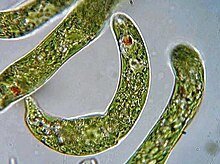Rose Bracher | |
|---|---|
| Born | 1894 Salisbury, England |
| Died | 15 July 1941 Briston, England |
| Nationality | British |
| Alma mater | University of Bristol |
| Occupation | Botanist |
| Known for | Fellow of the Linnean Society of London |

Rose Bracher (1894 – 15 July 1941) was a British botanist and academic.[1] She researched the ecology of the mud flats of the River Avon at Bristol and in particular the genus Euglena.
Bracher was born in Salisbury and obtained a B.Sc. in 1917, followed by an M.Sc. in 1918 and a Ph.D. in 1927, all from the University of Bristol. She worked as a demonstrator at the London School of Medicine for Women (1918–1920), was a lecturer at the East London College (1921–1924), and took up a post of lecturer at the University of Bristol in 1924 which she held until her death in 1941. Obituaries for Bracher were published in Nature and the Proceedings of the Linnean Society.[1][2]
She was elected a Fellow of the Linnean Society in 1938.[2]
In 1940 she was given the title of Senior Lecturer and in 1941 was the first non-professorial woman to be elected to the Senate of the University, a month before her sudden death.[2]
The University of Bristol offers an annual prize in her memory, the Rose Bracher Memorial Prize for the best student in botany, zoology and biology.[3]
- ^ a b Ogilvie, Marilyn; Harvey, Joy (2000). The Biographical Dictionary of Women in Science. Routledge. p. 434. ISBN 978-0-415-92039-1. Retrieved 22 February 2017.
- ^ a b c "Obituaries". Proceedings of the Linnean Society of London. 154 (3): 270. June 1943. doi:10.1111/j.1095-8312.1943.tb00329.x.
- ^ "Biological Sciences". Faculty of Science. University of Bristol. Retrieved 22 February 2017.